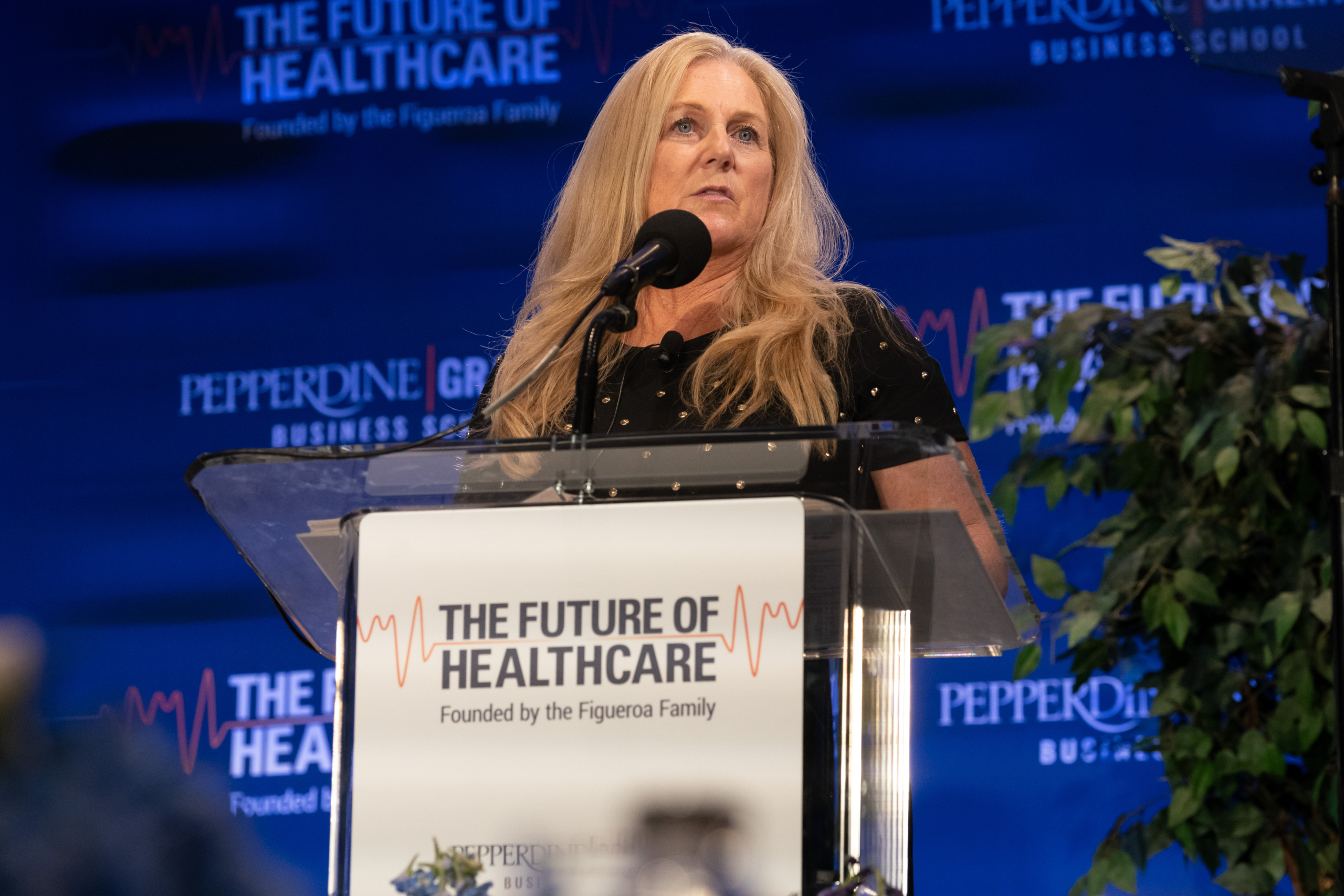5 Questions with Educator and Distinguished Alumna Kathleen Grave

The Future of Healthcare Symposium, hosted by Pepperdine Graziadio Business School. The 2019 theme, Healthcare Leadership in the AI Revolution: Opportunity in the Smart Machine Age, will explore pertinent topics for leaders to navigate today’s Smart Machine Age and provide a deeper understanding of how artificial intelligence will impact the healthcare industry. #GraziadioHealth @GraziadioSchool
From faculty that challenged her to participate every class period to the times spent between classes, Kathleen Grave (Social Science, ’82) fondly remembers her time at Chico State with a deep sense of community.
After graduating, she earned her doctorate in business administration at the University of Liverpool in the United Kingdom, with a scholarly focus on strategic, integrative, and sustainable smart cities. Since then, she has served in multiple leadership roles—following an early career in Silicon Valley’s high-energy startup environment, she spent more than two decades guiding global strategy for IBM. Since 2004, Grave has taught strategy, business management, and analytics at Pepperdine University’s Graziadio Business School, and in 2018 she assumed the role of CEO for Lassen Labs and InBold Inc., a science-backed cannabinoid company setting out to transform the healthcare industry. This month, she will be honored as the 2022 Distinguished Alumna of the College of Behavioral and Social Sciences.
Grave lives in Aptos with her husband, Kent. They have two children and two grandchildren.
What role does leadership play in your life?
It’s huge. I’ve always taken the type of job where there’s been more risk than reward in some situations. When I worked at IBM, I worked in emerging technology, so it wasn’t proven yet. I worked in innovator-early-adopter-stage projects, where you didn’t have that majority acceptance yet. But you knew there was something to be done. I retired from IBM because I had too many things to do before I got old. I realized both of the companies I started were in areas not widely accepted yet and they still aren’t—but they reflect what needs to be done. People need to transform the world. I’m now CEO of a CBD company. I went out to my favorite colleagues who are in traditional institutions—health care provider and payer positions, military leaders—and I asked, “Am I just absolutely doing the wrong thing taking a chance building this company?” They said, “No, it has to be done. Somebody has to step in, you’re the right person for it.” Part of leadership is having people that want to follow you, that want you to take that position. And a leader is also a good follower at times.
What is one motto you live by?
“The Golden Rule” is always huge to me. But when I put it into my own format, it’s also “whatever you do, do for the greater good.” You can’t make everybody happy all the time, but always take into consideration whether you’re doing the right thing, if you’re treating people the right way, and is it for the greater good.
How and where does “The Golden Rule” intersect with your teaching?
I love spending time with people and really hearing them and giving them a chance. Everyone comes from a different mountaintop, with different educations, different experiences, and different family backgrounds. Diversity is really a gift that a lot of people haven’t learned how to receive yet. Some of my favorite experiences have been my most difficult experiences with students, where I start out and I’m frustrated, thinking “why is this student taking this direction” or “why are they not watching out for themselves in their grade or putting their best foot forward,” and I realize they may have other struggles in life. So how can you collaborate with them to help them learn the most from the curriculum, meet the criteria, show competency in what you’re teaching them, and be able to demonstrate it? But also understand, particularly in this pandemic, they have an awful lot going on.
What is your advice for today’s students or alumni who are just beginning their careers?
Have balance in your life. At the end of the day, it’s all about the life you create. To those just starting their careers, go for it, do your very best, give it your all, and don’t phone it in. It’s also not about just going up in the company. It’s about the amount of influence and authority and capability to change behaviors of people that will help that company succeed. Make sure that what you’re doing is the very best for the role you’re taking on. It comes more naturally when you’re not worried about the next promotion. Also, you have to be able to walk away from things. Never get backed into a corner, even if you need to save up a certain amount of money when you go out and get your first job. It will save you from having to make unethical decisions or supporting something you truly don’t believe in.
How do you “Do and Dare?”
I named my company InBold because we’re going to pursue transforming healthcare. I dare to do it by putting my entire 35-year career and reputation on the line—but somebody has to do it. When you feel passionately that it’s the right thing, and then, of course, when you dare to do something, always vet it out with people. I don’t have all the answers. I really appreciate asking people, “What am I missing? Do I need to reframe this?” The collective around advancing thought into action is really making sure that you get insights from many people. Data will tell you things, but you also have to have the cognitive capability of the human perspective. Do it and dare to be the first, but also bring people along with you.


